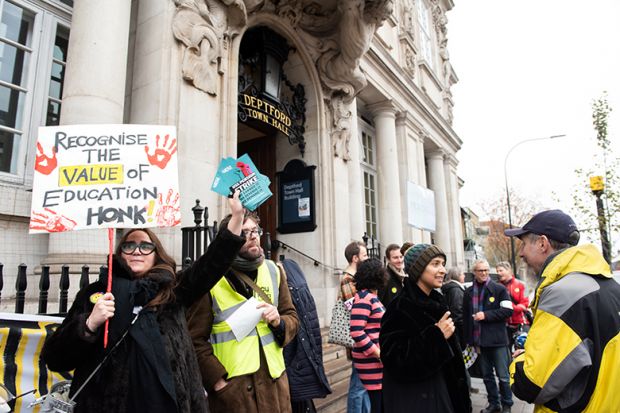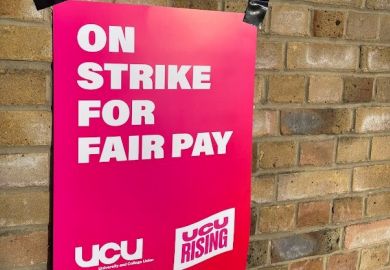UK universities face sector-wide strike action after University and College Union members backed industrial action in two historic ballots.
The union comfortably passed the 50 per cent turnout threshold – needed under trade union laws introduced in 2016 – and more than eight in 10 of those polled supported walking out.
For the first time in recent years, UCU ran an aggregated ballot, meaning all universities could now face disruption as opposed to the patchier action delivered by branch-by-branch polls that saw just 39 universities affected last time around.
THE Campus views: We need our collegiality reserves replenished post-Covid
In total, more than 70,000 staff at 150 universities were balloted, meaning disruption could affect millions of students’ education. The strike dates are yet to be confirmed but were originally pencilled in for November.
In the pay and working conditions ballot, 81.1 per cent of members across 145 institutions voted yes, on a 57.8 per cent turnout. In the pensions ballot, 84.9 per cent of members across 67 institutions voted yes, on a 60.2 per cent turnout.
Jo Grady, UCU’s general secretary, said union members had delivered “an unprecedented mandate for strike action”.
“The vice-chancellors who run universities have repeatedly and in a coordinated fashion come after our members. Well, now it’s 150 bosses against 70,000 university workers who are ready and willing to bring the entire sector to a standstill, if serious negotiations don’t start very soon.
“University staff are crucial workers in communities up and down the UK. They are sending a clear message that they will not accept falling pay, insecure employment and attacks on pensions. They know their power and are ready to take back what is theirs from a sector raking in tens of billions of pounds.”
UCU has called for a pay rise of 12 per cent, or 2 per cent above retail price index inflation, and rejected an offer of just over 3 per cent for most employees which has already been implemented by the Universities and Colleges Employers Association (Ucea).
The pay and working conditions ballot also called for an agreed framework to eliminate insecure work practices such as zero-hours contracts, and action to address “dangerously high” workloads.
The union has warned that cuts to pensions provided by the Universities Superannuation Scheme will cost members thousands of pounds annually in retirement and argues they could now be reversed, given the improving financial picture of the fund in recent months.
Raj Jethwa, Ucea’s chief executive, said that universities could not afford to improve on this year’s pay offer.
“HE institutions want to do more for their valuable staff, but any increase in pay puts jobs at risk. UCU’s own research confirms that, in many parts of the country, HE institutions are important local employers. Those communities simply cannot afford to lose jobs,” Mr Jethwa said.
A Universities UK spokeswoman said that employer contributions to USS pensions were “at the very limit of affordability” and that further changes could not be made ahead of a full valuation scheduled for March next year. She warned that industrial action “is likely to impede joint working on the next valuation, and delay much-needed changes such as governance reform of the scheme and the introduction of lower cost options for members”.
“We understand that the ballot results may leave students concerned about the impact that potential industrial action could have on their degrees. Universities are adept at mitigating the impact of strikes on student learning, and so prepared for any further possible industrial action over the coming months,” UUK said.
“Universities will put in place a series of measures to minimise the impact of any industrial action on students, other staff and the wider community.”
Members of Unison, another higher education union that tends to represent those at the bottom of the pay scale such as cleaners, catering staff and security guards, have also held strikes in September and October over pay, although only 16 institutions have been affected.
Register to continue
Why register?
- Registration is free and only takes a moment
- Once registered, you can read 3 articles a month
- Sign up for our newsletter
Subscribe
Or subscribe for unlimited access to:
- Unlimited access to news, views, insights & reviews
- Digital editions
- Digital access to THE’s university and college rankings analysis
Already registered or a current subscriber? Login








